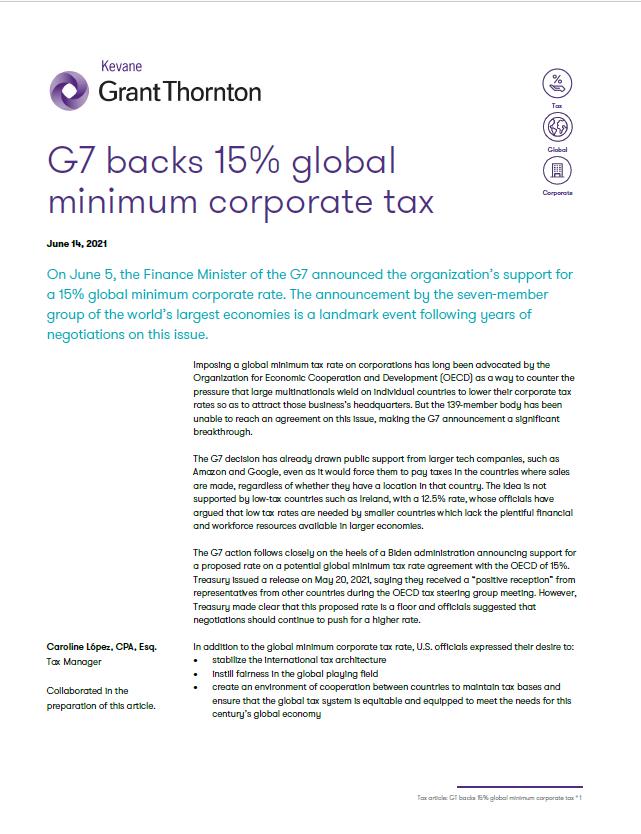Imposing a global minimum tax rate on corporations has long been advocated by the Organization for Economic Cooperation and Development (OECD) as a way to counter the pressure that large multinationals wield on individual countries to lower their corporate tax rates so as to attract those business’s headquarters. But the 139-member body has been unable to reach an agreement on this issue, making the G7 announcement a significant breakthrough.
The G7 decision has already drawn public support from larger tech companies, such as Amazon and Google, even as it would force them to pay taxes in the countries where sales are made, regardless of whether they have a location in that country. The idea is not supported by low-tax countries such as Ireland, with a 12.5% rate, whose officials have argued that low tax rates are needed by smaller countries which lack the plentiful financial and workforce resources available in larger economies.
The G7 action follows closely on the heels of a Biden administration announcing support for a proposed rate on a potential global minimum tax rate agreement with the OECD of 15%. Treasury issued a release on May 20, 2021, saying they received a “positive reception” from representatives from other countries during the OECD tax steering group meeting. However, Treasury made clear that this proposed rate is a floor and officials suggested that negotiations should continue to push for a higher rate.
In addition to the global minimum corporate tax rate, U.S. officials expressed their desire to:
- Stabilize the international tax architecture
- Instill fairness in the global playing field
- Create an environment of cooperation between countries to maintain tax bases and ensure that the global tax system is equitable and equipped to meet the needs for this century’s global economy
The G7 agreement has no binding authority, however, and the corporate tax rate in the United States already is at 21%, with the Biden administration advocating an increase to as much as 28%. For Biden, the agreement helps address concerns that raising the corporate tax rate here would put the nation at a competitive disadvantage with low-tax countries.
The global minimum corporate tax rate proposal is likely to be discussed at next month’s G20 Finance Ministers meeting.
What does this mean for Puerto Rico?
For decades, Puerto Rico has positioned itself as a United States jurisdiction with a strategic location, highly specialized workforce, and reduced tax rates for businesses. Three and a half years into the introduction of the Global Intangible Low-Taxed Income (GILTI) by the Tax Cuts and Jobs Act of 2017, businesses aiming to operate in Puerto Rico have had to plan around the potential imposition of the GILTI to their Puerto Rico operations. GILTI created a complex formula to tax controlled foreign corporations’ (CFC) profits earned in foreign jurisdictions that are highly profitable with low taxation. Presently, the GILTI increases United States Shareholders’ federal tax bill from 10.5% to 37% on net income over 10% of net assets of a Puerto Rico CFC. The percentage of GILTI depends on the structure of the CFC. Therefore, doing business in Puerto Rico will not necessarily be negatively impacted by a G7 agreement as individuals or businesses coming to Puerto Rico are keen to doing business in the international arena. Now, it is in the Puerto Rico government’s interest to make the island more competitive in an international arena with an arguably level playing field.
This article has been adapted from a publication titled “G7 backs 15% global minimum corporate tax”, authored and published by Grant Thornton, Washington National Tax Office, on June 8, 2021.

